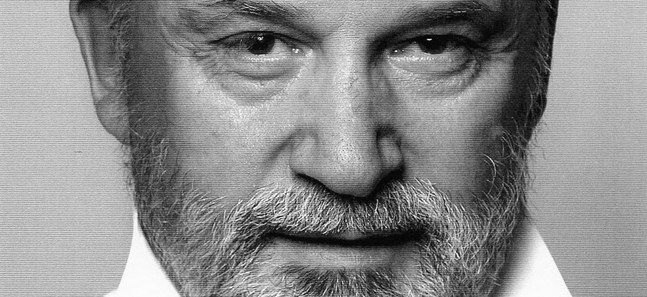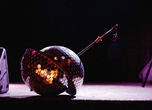Interview: Giorgio Moroder
The iconic disco innovator: producer, songwriter, composer… and DJ

Posted: Tue May 21 2013
He’s the man behind groundbreaking disco tracks with the late Donna Summer; he owns three Academy Awards, including one for Best Original Score for his work on Midnight Express; he’s snagged Grammys galore, notably for the Flashdance score; and, besides Summer, he’s produced artists ranging from David Bowie and Cher to Adam Ant and RuPaul. Most recently, he's lent his voice (and life story) to the new Daft Punk album Random Access Memories, but apparently that’s not enough for pioneering producer Giorgio Moroder – now he's a DJ. Fresh from his first-ever DJ gig at the Red Bull Music Academy edition of Deep Space in New York, he'll be hitting the decks in Tokyo on May 27 and 28.
I’m hoping it doesn’t make you feel old if I say I’ve been a huge fan of yours for pretty much my whole life.
That’s okay – I am old!
That hasn’t stopped you from starting a new career as a DJ, though.
Yeah, I am becoming a DJ… and I don’t know why, really. [Laughs]
You have a collaboration of sorts on the new Daft Punk album, right?
Yes, and that album came out on May 21, the day after my New York date. I wouldn’t really call it a collaboration; they just asked me to sit in a studio and record my voice telling a story.
What story is that?
Oh, the story of my life, how I got into the business, that sort of thing. I think I ended up talking for three hours! And now they have a tape with my whole life. I told Thomas [Bangalter] that one day we should release the whole thing. [Laughs] When I did it, I had no idea how they were going to incorporate my voice in the track – but when I heard the result, I loved it. It was kind of odd, hearing myself speaking about how I had to sleep in the park when I was younger because I had no money to afford a hotel after I played in the discotheque.
That would have been back in the ’60s?
Yeah. I was composing at the time, but you needed a big hit to live in a decent way. Listening to myself tell all those stories was quite emotional. To some extent, it’s the story of disco and how it developed. I think they did a really good job with the track; the music they made was very good. As some journalist said, I’m probably one of the few people in the world whose biography is a song. The finished track is 11 minutes; it has some great breaks. I love it.
Had you known much about Daft Punk before they asked you to do this?
I had heard several songs by them, but the one that I really liked was ‘One More Time’. I like the Auto-Tune on that, and that break in the middle when it’s just the organ. I was really impressed by that song.
It almost could be a modern take on a 1978 Moroder track.
[Laughs] Yeah, I could have done it… but probably not as well as they did. That voice on the song sounds great, with all the compression and effects. It works really well. In fact, after this interview, I’m going to listen to that song again.
I wanted to take a minute to talk to you about Donna Summer. Had you been in touch with her much before she passed away last year?
I had actually lost track of her for a while, but more recently, I was meeting with her regularly. Then, in the last few years, she had the apartment right below me in my high-rise on Wilshire here in Los Angeles.
Really?
Yes, really! And we were basically meeting about once a week, for lunch or dinner or whatever. I certainly saw her more during the last few years than I did in the second half of the ’80s and the ’90s.
It’s quite a coincidence that you and she had apartments that were so close to each other.
She used to live here in Los Angeles, but she had moved to Nashville. Then she wanted to come back. I had invited her for dinner at my place, and she loved it. So she took the apartment below with Bruce [Sudano, her husband]. It was very nice.
A lot of the tracks you made with her and your co-composer, Pete Bellotte – notably ‘I Feel Love’ and ‘Love to Love You Baby’ – had a huge influence on dance music, and popular music in general. Did you have any inkling that what you were doing back then would prove to be so pioneering?
Well, with ‘Love to Love You’… it’s a sexy song, and there are always sexy songs around. But the big thing with that one was that it was one of the first songs to have a 17- or 18-minute version. I don’t think anyone had done that before in this context.
And ‘I Feel Love’?
That one definitely was something new. At least that’s what people tell me! [Laughs] I had actually used synthesizers quite often before then, to the point where I had gotten tired of them. The concept of that album [I Remember Yesterday] is that we were trying to represent different musical eras, and we needed a futuristic song. It’s not easy to do a futuristic song! But I realised that the synthesizer was probably the only kind of sound that would indicate ‘future’. So I started to work on the bassline, which wasn’t so easy; the Moog was always out of tune, and every 20 seconds we had to retune it.
They are notorious for that.
Yes, it wasn’t that easy. But once the bassline was done, the rest was relatively easy. We put some nice white noise on the computer, and then triggered it as the snare drum and hi-hats. Except for the kick drum, all the drums were actually synthesizers triggered by a click. I think people still are influenced by that driving bass and rhythm.
The song certainly played a big role in the evolution of house and techno. You even hear that same bassline quite often.
The original bassline was a bit simpler: da da da da, da da da da. When I mixed it down, I asked my engineer, ‘Why don’t we add a little bit of delay and see how it sounds?’ And he put a little delay on the bassline, and suddenly it was dada dada dada dada, dada dada dada dada. That changed the whole feel of the song. At that time, it was really difficult to get the exact tempo so that the bassline would double like that; nowadays, you know the exact BPM and you adjust the delay exactly how you want, but then, you really had to guess. It took several hours to get it right. But I think it turned out quite nice.
Do you foresee a new career in DJing?
We’ll see! Right now, I am working with [EDM star] Avicii here in Los Angeles, and we were talking the other day about the record business, and how far it has gone down. But the DJ is making more and more money. It’s incredible! So… I now have an agent for DJing.
It’s a different lifestyle than what you probably are used to.
I wouldn’t do it too much, not two or three or four gigs a month. Maybe just the big ones, and at the same time I’ll be composing and producing. I have some great offers, so in the next few weeks, I’ll be figuring all this out. Whatever the case, I think I am ready to go back to work.
Yes, it seems as though you have a renewed energy.
Well, I haven’t really done too much lately! So this will be good.
Your place in history is secure. Why do this at all?
You know, I always wanted to perform. When I was young, I did a few gigs, but I don’t have a great singing voice – plus, I always forget lyrics. So at one point, I just said, ‘I don’t want to do it’. But now, with DJing – that is almost like performing! Plus, I just love dance music. I don’t do it because I want to just make money. And I’m not disturbed at all by the volume of the music; even at home, when I listen with headphones, my ears are almost exploding!
Ha!
And I feel like DJs aren’t just the new stars; the really good ones are so powerful. I was in Ibiza last summer, and it was incredible. It’s like a conductor, telling the musicians, ‘Go slow now. Go loud now.’ DJs are doing the same thing. I’m not there yet, but I hope it will happen.
Giorgio Moroder plays with DJ Chris Cox at Billboard Live, Roppongi on May 27 and 28
Tweets
- About Us |
- Work for Time Out |
- Send us info |
- Advertising |
- Mobile edition |
- Terms & Conditions |
- Privacy policy |
- Contact Us
Copyright © 2014 Time Out Tokyo














Add your comment